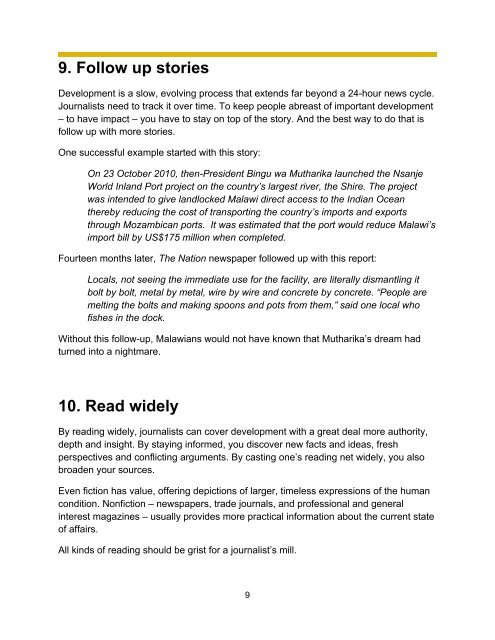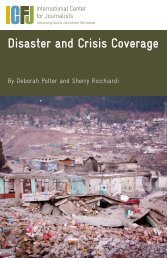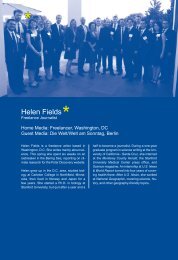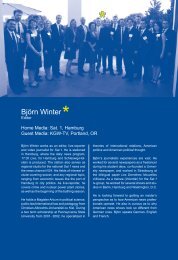Download PDF - International Center for Journalists
Download PDF - International Center for Journalists
Download PDF - International Center for Journalists
Create successful ePaper yourself
Turn your PDF publications into a flip-book with our unique Google optimized e-Paper software.
9. Follow up stories<br />
Development is a slow, evolving process that extends far beyond a 24-hour news cycle.<br />
<strong>Journalists</strong> need to track it over time. To keep people abreast of important development<br />
– to have impact – you have to stay on top of the story. And the best way to do that is<br />
follow up with more stories.<br />
One successful example started with this story:<br />
On 23 October 2010, then-President Bingu wa Mutharika launched the Nsanje<br />
World Inland Port project on the country’s largest river, the Shire. The project<br />
was intended to give landlocked Malawi direct access to the Indian Ocean<br />
thereby reducing the cost of transporting the country’s imports and exports<br />
through Mozambican ports. It was estimated that the port would reduce Malawi’s<br />
import bill by US$175 million when completed.<br />
Fourteen months later, The Nation newspaper followed up with this report:<br />
Locals, not seeing the immediate use <strong>for</strong> the facility, are literally dismantling it<br />
bolt by bolt, metal by metal, wire by wire and concrete by concrete. “People are<br />
melting the bolts and making spoons and pots from them,” said one local who<br />
fishes in the dock.<br />
Without this follow-up, Malawians would not have known that Mutharika’s dream had<br />
turned into a nightmare.<br />
10. Read widely<br />
By reading widely, journalists can cover development with a great deal more authority,<br />
depth and insight. By staying in<strong>for</strong>med, you discover new facts and ideas, fresh<br />
perspectives and conflicting arguments. By casting one’s reading net widely, you also<br />
broaden your sources.<br />
Even fiction has value, offering depictions of larger, timeless expressions of the human<br />
condition. Nonfiction – newspapers, trade journals, and professional and general<br />
interest magazines – usually provides more practical in<strong>for</strong>mation about the current state<br />
of affairs.<br />
All kinds of reading should be grist <strong>for</strong> a journalist’s mill.<br />
9

















